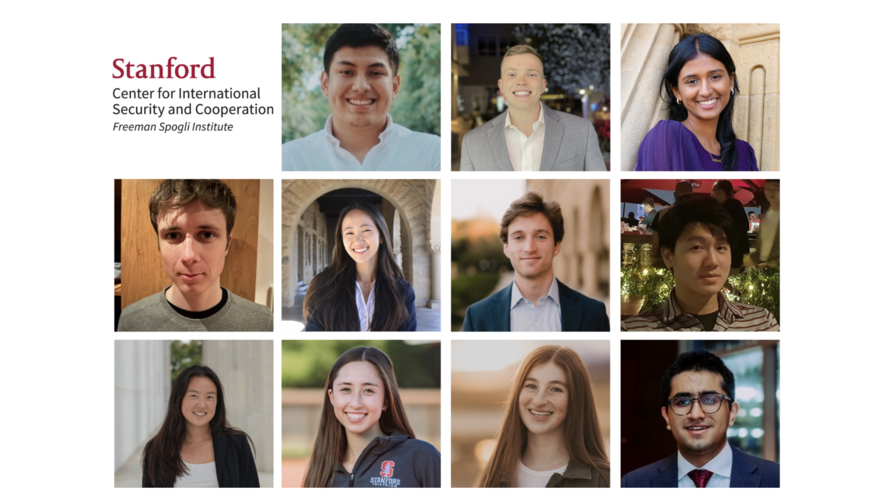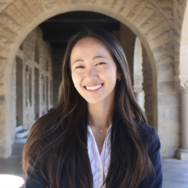Introducing Our 2023-24 CISAC Honors Students
Introducing Our 2023-24 CISAC Honors Students
We are thrilled to welcome eleven outstanding students, who together represent thirteen different majors and minors, to our Honors Program in International Security Studies.

The CISAC Interschool Honors Program in International Security Studies provides an opportunity for seniors from all undergraduate schools and majors who have strong academic records and interest in international security to receive Honors in International Security Studies. Students are admitted to the program on a competitive basis during winter quarter of junior year. The award of Honors is in addition to the student's major, which may be in any department or program. The CISAC Honors Program has drawn students from 28 different major departments and programs since its inception in 2000 and has an alumni network of over 200 former students.
We are thrilled to welcome eleven outstanding students to the class of 2023-24!
Meet the Students

Bryan Benitez
Major: Political Science
Minor: History
Hometown: Houston, TX
Thesis Advisor: Beatriz Magaloni
Tentative Thesis Title: US - Latin America Security Relationships in the Northern Triangle
Why is this topic important to the field of international security? Latin America's relationship with the United States is rapidly evolving in the aftermath of the Cold War and the War on Drugs, with countries recalibrating their domestic policies with America's strategic goals. In the Northern Triangle, the aftermath of civil wars and a lack of state control has resulted in increasing violence, creating wider geopolitical issues. Despite these dynamics, current analyses overlook the security implications in the Northern Triangle despite its widespread impact.
What attracted you to the CISAC undergraduate honors program? CISAC’s international and interdisciplinary focus helps me connect with other researchers tackling similar questions in other parts of the world, allowing us to work together and discuss potential solutions to the problems faced by our countries. As I hope to go into policymaking and law in the future, this program will help strengthen my intellectual foundations regarding policymaking while helping me maintain a critical perspective toward American foreign policy.
Future aspirations post-Stanford: I hope to eventually go to law school after gaining experience in the policy world after graduating. I aim to focus on Latin American issues from an American perspective, knowing the strong ties that exist between both states.
A fun fact about yourself: Outside of academics, I'm a huge soccer fan and try to watch as many games as I can as I'm a huge F.C Barcelona fan.

Graham Chernik
Major: International Relations
Hometown: Dallas, TX
Thesis Advisor: Oriana Mastro
Tentative Thesis Title: Causal Effects of Large-Small State Diplomacy: China’s Gray Zone Military Tactics in the Indo-Pacific
Why is this topic important to the field of international security? China continues to be an emerging player in the realm of international security and geopolitics. It is important for policymakers and American statesmen alike to become more cognizant of China's ambiguous security tactics in the Indo-Pacific and how to combat them.
What attracted you to the CISAC undergraduate honors program? I look to elevate my interest in Sino-American great power relations via a regionally-focused thesis project. The CISAC honors program is the best way to achieve this goal whilst becoming a more adept academic.
Future aspirations post-Stanford: Through the Reserve Officers Training Corps program, I aspire to commission as an officer in the United States Marine Corps.
A fun fact about yourself: I aspire to travel to every country in the world!

Kyla Guru
Major: Computer Science
Minor: International Relations
Hometown: Deerfield, IL
Thesis Advisor: Andrew Grotto
Tentative Thesis Title: Machine Learning for Cyber-Attack Attribution: Technical, Policy, and Ethical Considerations
Why is this topic important to the field of international security? Each red-team exercise is a “war-game” for an organization to test the resilience withstand attack—what if we could bolster the US’ defense-in-depth and “Defend Forward” with cleaner responses and quicker response times? Applications of my research will have potential to make post-breach attribution of the adversary faster, enable red-teaming efforts to be more tailored for industries being targeted by specific persistent threat groups, and allow for a deeper, more quantitative understanding of our most notorious cyber-adversaries abroad.
What attracted you to the CISAC undergraduate honors program? The opportunity to tackle large questions that I have seen industry and government face in cybersecurity, and the access to brilliant faculty and peers that will allow me to explore these curiosities through research and discussion.
Future aspirations post-Stanford: Anywhere working on cutting-edge technology work at the intersection of cybersecurity, tech policy, law, and human-centered design.
A fun fact about yourself: I love working with kids and I'm passionate about K-12 education! I recently traveled to teach cybersecurity to middle-schoolers across India!

Ben Harris
Major: International Relations
Minor: Economics and History
Hometown: Birmingham, AL
Thesis Advisor: Rose Gottemoeller and Scott Sagan
Tentative Thesis Title: The Future of Multilateral Arms Control: Lessons from History
Why is this topic important to the field of international security? Nuclear security and arms control remains an ongoing concern, especially as New START, the last major Russo-American nuclear treaty, breaks down. However, any future treaty will have to include more players, complicating the process. I hope to examine historical case studies to shed light on best practices for moving forward with future negotiations
What attracted you to the CISAC undergraduate honors program? I have always been keenly interested in international relations, especially issues that related to cooperation between nations. CISAC allows me to combine my interest in history and international affairs in unique ways, while providing incredible support and wonderful opportunities for me as a student.
Future aspirations post-Stanford: I am unsure at the moment, but I will probably attend graduate school within the next few years.
A fun fact about yourself: I love to cook whenever I can, especially Italian food.

Evian Jiang
Major: Economics
Minor: International Relations
Hometown: Alameda, CA
Thesis Advisor: Scott Sagan
Tentative Thesis Title: American Public Attitudes on the Defense of Taiwan
Why is this topic important to the field of international security? The People’s Republic of China (PRC) has “increased provocative and destabilizing actions” against Taiwan. In an era of increasingly tense relations with China, the Biden administration has repeatedly affirmed that American forces would defend Taiwan in the event of a Chinese invasion. Yet, it is unclear under what conditions the American people would support an American military defense of Taiwan. For policymakers, it is crucial to better understand these uncertainties in order to best represent the American people.
What attracted you to the CISAC undergraduate honors program? The CISAC Honors Program would provide me with the incredible opportunity of conducting a long-term research project combining my academic, professional, and personal curiosities. I am excited by the prospect of applying my research skills to not only better understand issues that I am passionate about, but to contribute to the literature on present-day Chinese-American relations. As a student intending to work in national security policy, I ardently believe that both the CISAC community and the technical skills I would gain would be invaluable. The CISAC Honors Program would enable me to bridge the gap between my undergraduate experience and my future academic and career goals.
Future aspirations post-Stanford: After graduating, I hope to start my career at the intersection of national security, US-China relations, and technology policy.
A fun fact about yourself: I love to play tennis and travel!

Matt Kaplan
Major: Computer Science
Minor: Political Science
Hometown: Nashville, TN
Thesis Advisor: H.R. McMaster and Herbert Lin
Tentative Thesis Title: Software for Warfare: The Changing Nature of American Industry's Authority in Times of Armed Conflict
Why is this topic important to the field of international security? Many of today's most advanced technologies are built by private companies and deployed by those companies as services. While private companies can therefore play a large role in supporting U.S. national security objectives in times of war, this expanded authority grants these companies more leverage to affect the dynamics of warfare according to their own incentives. The U.S. will have to grapple with this new set of issues to ensure that it can best provide the resources needed to meet its national security objectives.
What attracted you to the CISAC undergraduate honors program? Since arriving at Stanford, I have pursued my interests in technology and national security largely independently. For my final undergraduate year, I have sought a rigorous, year-long capstone project that would allow me to develop these different interests in a multidisciplinary fashion. The CISAC Honors Program offers the opportunity to develop such a project and to develop the knowledge and skills necessary to be an effective public servant and leader.
Future aspirations post-Stanford: I hope to contribute to U.S. national security by helping to ensure that the U.S. has the right technological tools for a safe and prosperous future. I hope to pursue this field both through building those tools and through crafting policy that catalyzes our ability to do so. In the long term, I am interested in serving at this intersection of foreign policy, national security, and technology.
A fun fact about yourself: Many of my favorite memories at Stanford have been the roadtrips I have taken with friends throughout California. I still have more places to see, but I have been consistently mesmerized by all that this state has to offer!

JB Lim
Major: Mathematical and Computational Science
Minor: International Relations
Hometown: Seoul, Korea
Thesis Advisor: Larry Diamond
Tentative Thesis Title: Strategic Alignment of Asia-Pacific nations amidst the US-China competition
Why is this topic important to the field of international security? The strategic thinking of Asia-Pacific nations will influence the balance of power, regional stability, and potential for conflict escalation. Their alignment decisions between the U.S. and China directly affect the future of the international economy, configuration of multilateral institutions, and the capacity of nations to collectively address pressing global issues.
What attracted you to the CISAC undergraduate honors program? The CISAC undergraduate honors program presents a valuable opportunity for me to further my scholarly and personal interest for international security and policy. I am eager to learn from experienced faculty, make meaningful contributions to the cohort, and broaden my knowledge through the program’s exceptional resources.
Future aspirations post-Stanford: Although I remain undecided, I hope to ultimately become an international public servant that contributes to enhancing global cooperation and mitigating complex challenges between nations worldwide.
A fun fact about yourself: Until last summer, I served in the Republic of Korea Army for 18 months as Squad Leader Sergeant and trained cadet officers in daily sessions. To my surprise, I ranked among the top shooters during a K2 rifle practice in a snowy mountainous region.

Marianne Lu
Major: International Relations
Hometown: Beijing, China and Palo Alto, CA
Thesis Advisor: Andrew Grotto
Tentative Thesis Title: Beyond the Rhetoric: China's Approach to AI Governance
Why is this topic important to the field of international security? In recent years, China’s use of Artificial Intelligence (AI) has been used to justify much of American technology policy, including investment in semiconductors, the ban on Huawei, and restrictions on technology and equipment to Chinese chip firms. Understandably so –– China has leveraged AI for mass surveillance and will inevitably deploy AI for other malicious purposes. Nevertheless, beyond the rhetoric that frames China as a bad actor in the realm of AI, the policies and rules that undergird China’s AI ecosystem have not been extensively studied. This understanding is crucial if the US wants to compete better with China, and also if it wants to cooperate in certain areas as well. While it may be tempting to view Chinese AI policy as little more than a facade to cover widespread abuses of human rights, that response risks ignoring important implications for policy-making.
What attracted you to the CISAC undergraduate honors program? I've always wanted to wrap up my time at Stanford by producing independent research in a field I care deeply about. I was drawn to the CISAC honors program in particular because of its focus on international security and cooperation, as well as its strong network of faculty, fellows, and alumni. I'm looking forward to diving deep into a topic and bringing together the various skillsets and frameworks that I've explored during my time in college, as well as learning from mentors and peers!
Future aspirations post-Stanford: I hope to work at the intersection of law, technology, and US-China relations.
A fun fact about yourself: I'm a certified safari guide!

Bridget Patrick
Major: Electrical Engineering
Minor: Mechanical Design
Hometown: Menlo Park, CA
Thesis Advisor: Rodney Ewing
Tentative Thesis Title: Cybersecurity Risks in the United States Electrical Grid
Why is this topic important to the field of international security? The U.S. electrical grid as it stands now is vulnerable to cyber attacks, and this threat will continue to grow as the technology ages. The grid is susceptible to attacks by terrorist groups and is not protected in case of war if a country were to target the United States’ power system.
What attracted you to the CISAC undergraduate honors program? I am excited about the CISAC honors program because of its interdisciplinary nature and being surrounded by motivated individuals from a variety of academic backgrounds. The research I will conduct while developing my thesis provides a practical use for my electrical engineering background, while also allowing me to look into policy and political threats. This combination of technical and political science work will be a stepping stone in showing me what careers I can pursue with an engineering degree, specifically in improving national and international security.
Future aspirations post-Stanford: I hope to pursue a graduate degree and then pursue a career in defense where I can apply my electrical and mechanical engineering background.
A fun fact about yourself: I do triathlons!

Keely Podosin
Major: Science, Technology, and Society
Minor: Political Science
Hometown: Mammoth Lakes, CA
Thesis Advisor: Oriana Mastro and Paul Edwards
Tentative Thesis Title: Unveiling China's AI Innovation: An Analysis of Their Development of Artificial Intelligence Technology
Why is this topic important to the field of international security? This topic is important to the field of international security and cooperation because emerging technologies, like artificial intelligence, are making their way to the forefront of security and defense conversations. Learning about China's methods to advance AI research and innovation could help quicken U.S. innovation in the field.
What attracted you to the CISAC undergraduate honors program? My interests in international security first arose during my sophomore year at Stanford, where I found myself continually drawn to courses surrounding the subject. I saw the CISAC undergraduate honors program as an amazing opportunity to take my learning beyond the classroom and explore my specific interests at the intersection of technology and national security. I was also very excited about going through an honors program with a tight-knit cohort of classmates interested in similar subjects as me. I'm very excited to be a part of this upcoming cohort and explore themes of AI and international security!
Future aspirations post-Stanford: I'm interested in technology, policy, and national security. Although I don't know exactly where this will take me, I will strive for my work to always positively impact society.
A fun fact about yourself: I grew up ski racing and love to ski!

Neelay Trivedi
Major: Philosophy and Economics
Hometown: Warren, NJ
Thesis Advisor: Glenn Tiffert
Tentative Thesis Title: The PRC's Use of Financial Tools and Cross-Border M&A in the Green Economy
Why is this topic important to the field of international security? Climate change is traditionally viewed as an issue where the United States and PRC could effectively cooperate. However, there is growing evidence that the PRC views the green economy as a plane of strategic competition. The goal of my thesis is to investigate this claim by examining Chinese green investments globally in order to determine whether they pose national security risks for the United States.
What attracted you to the CISAC undergraduate honors program? The CISAC honors program provides a unique opportunity to apply social science methods to a research project with national security implications.
Future aspirations post-Stanford: I would like to work in the private sector and eventually enter public service.
A fun fact about yourself: I'm a lifelong New Jersey resident and I think it's the best state in the country.
